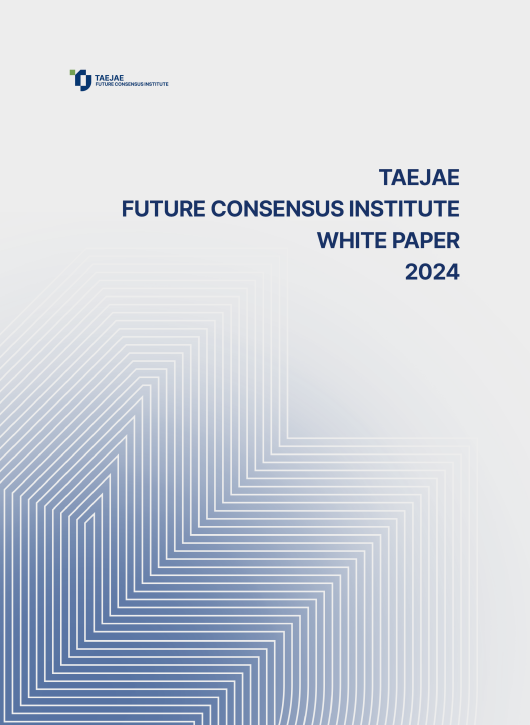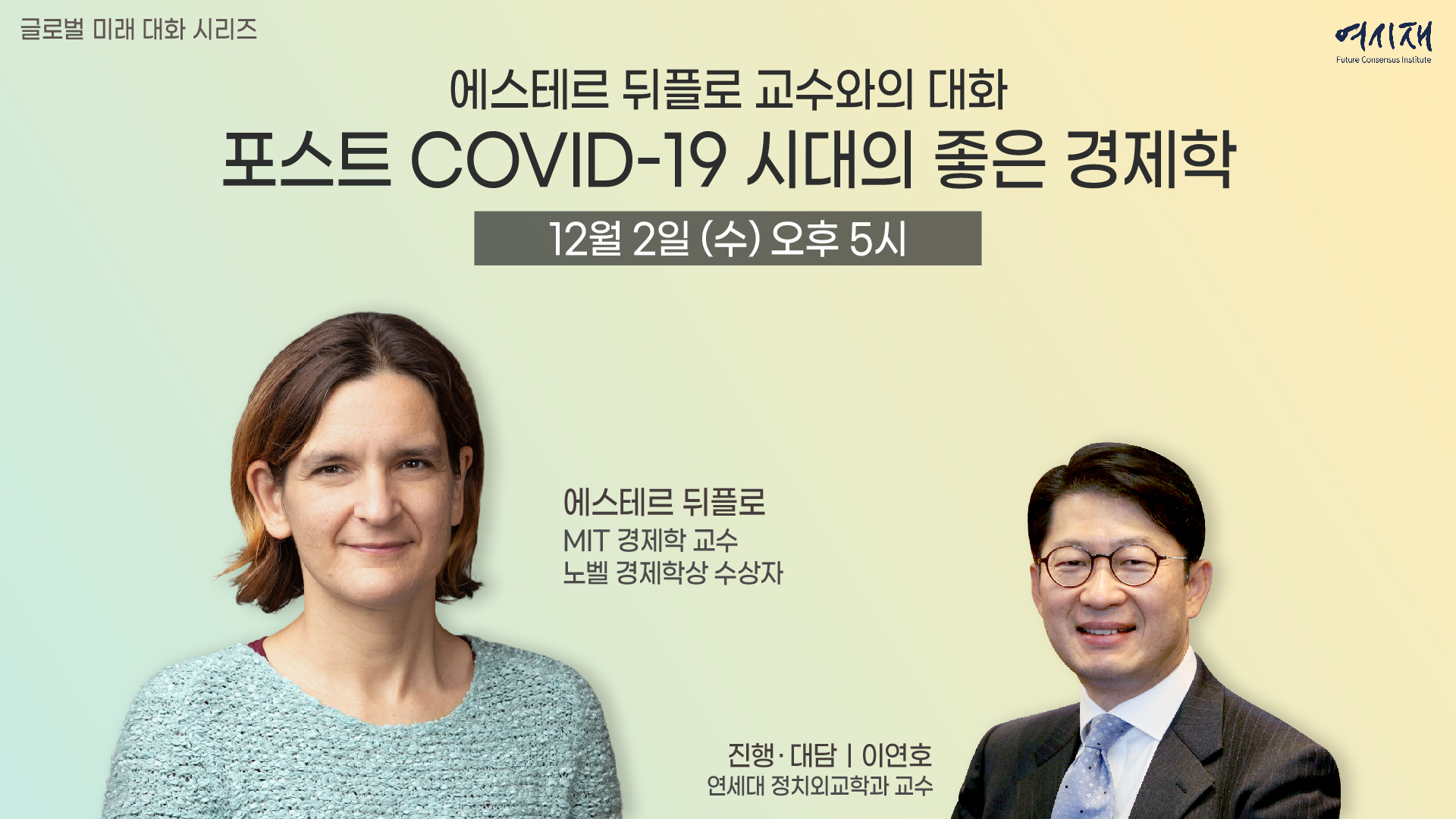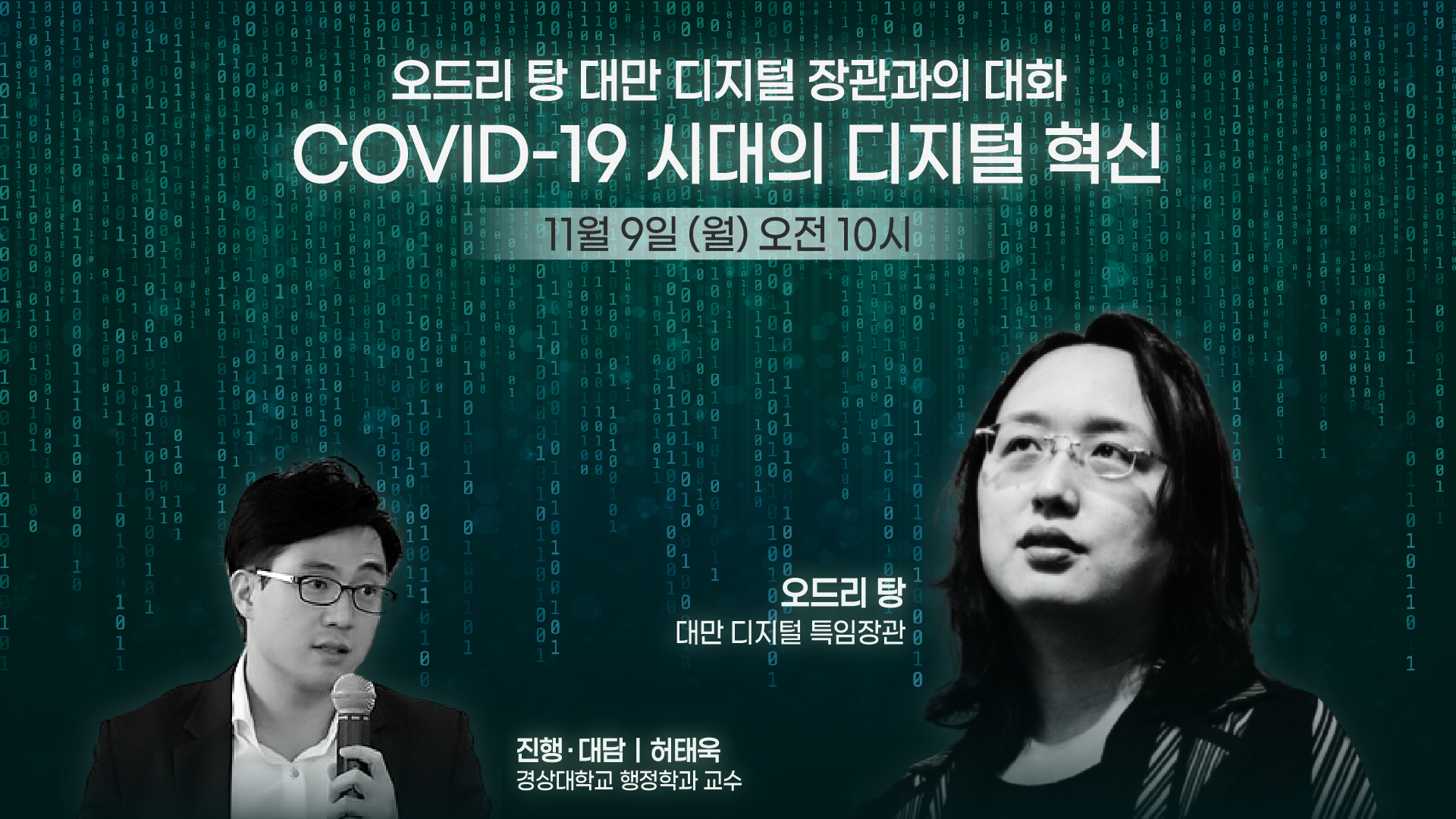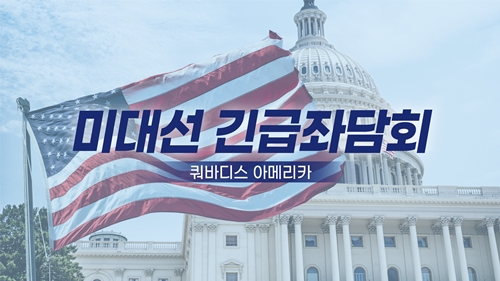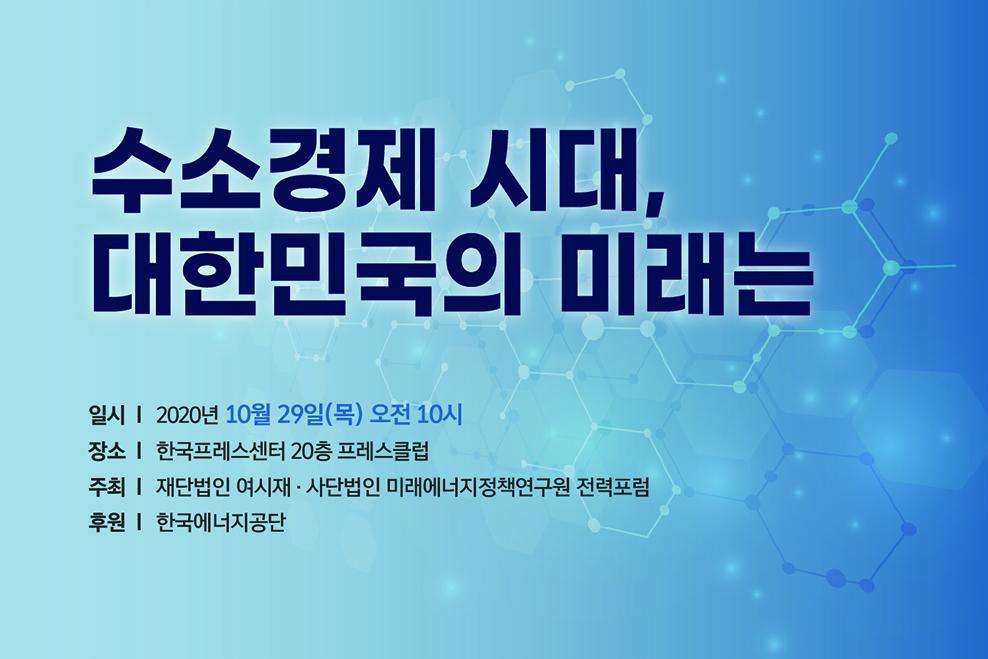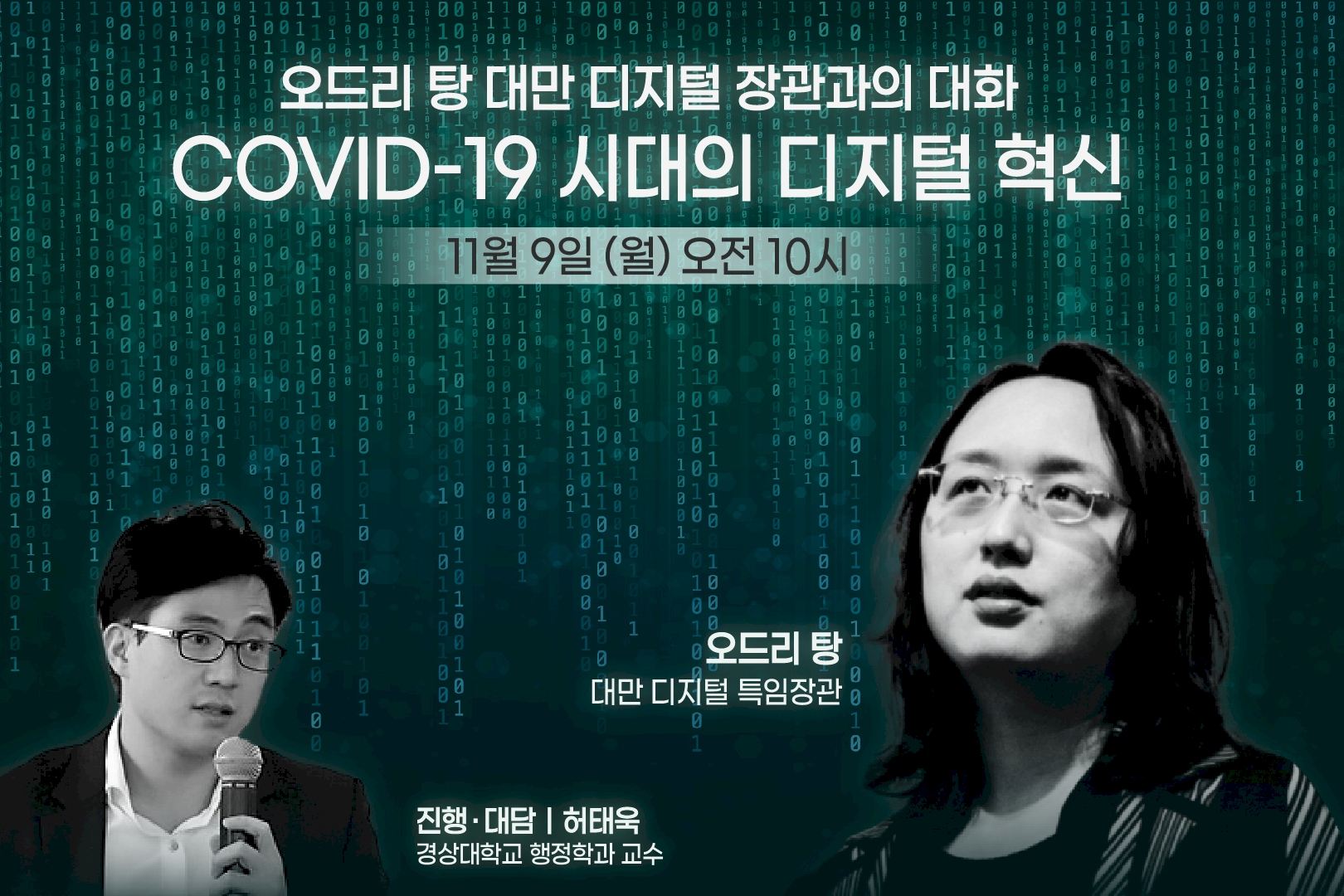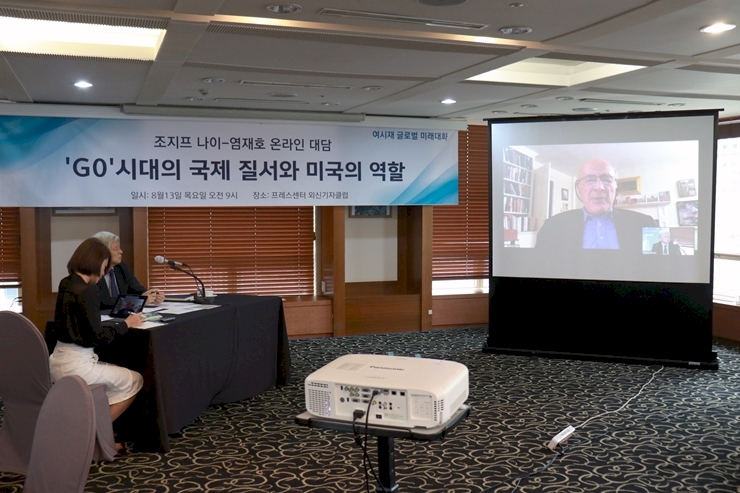Please join Yeosijae as we build a brighter future for Korea. Create your account to participate various events organized by Yeosijae.
- Insights
- |
- Sustainability
- Global Order and Cooperation
[Global Future Dialogue ⑧: A Conversation with Professor Esther Duflo] Good Economics for Post-COVID-19 World
“The growth is not important, per se. What is important is welfare.”
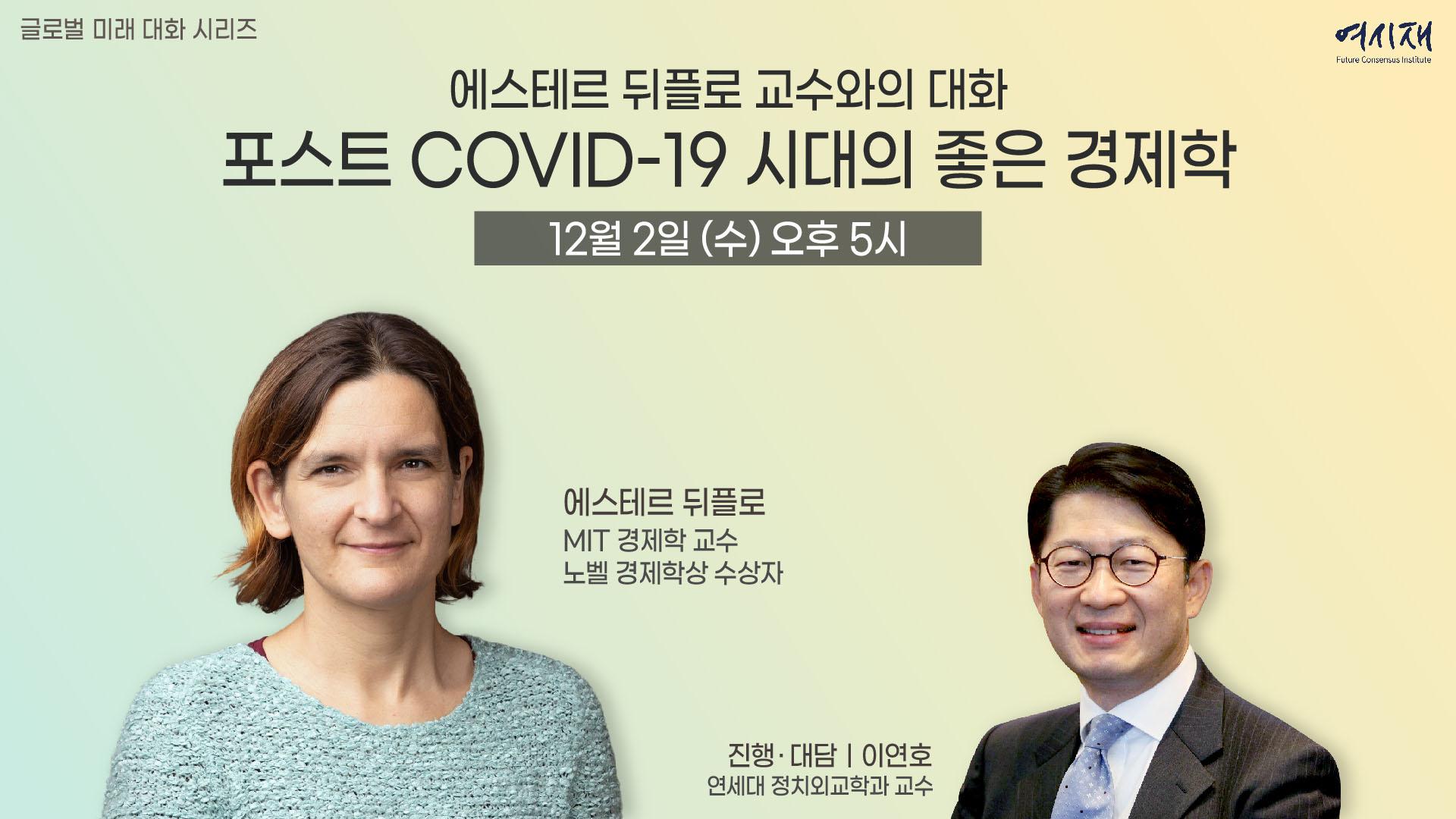
On December 2, Yeosijae hosted a webinar with MIT professor and co-winner of Nobel Prize in economics, Prof. Esther Duflo, to discuss poverty and inequality in the context of COVID-19. The session was moderated by Yeon-ho Lee, Professor of Political Science and International Relations at Yonsei University. Last year, Prof. Duflo, together with Abhijit V. Banerjee, published the book Good Economics for Hard Times, and it remains highly relevant in the times of COVID-19.
During the discussion, the speakers discussed not only the lessons from the book but also urgent issues emerging globally and domestically and explored alternative solutions to these problems. Yeosijae summarized Prof. Duflo’s keynote speech and discussion highlights for our readers.
Keynote Highlights
Inequality and COVID-19: Globally and within the countries
Prof. Duflo started her keynote speech by pointing out the main consequences of COVID-19. According to Prof. Duflo, the pandemic gave rise to health and economic crises worldwide, and this has had a tremendous impact on poverty and inequality. Though there has been significant progress in poverty reduction globally in recent years, COVID-19 has created disruptions. Its impact on global poverty, infant and maternal mortality, and education opportunities may have long-term consequences. “COVID-19 is estimated to push an additional 88 million to 115 million into extreme poverty this year, with the total rising to as many as 150 million by 2021”. Prof. Duflo raised concerns that rich nations, including the OECD members, have done very little to help poor countries during this pandemic. “This means that what is probably going to be a temporary crisis with a swift rebound in the richest countries might become a much more durable crisis in developing countries,” she said.
According to the professor, the pandemic not only increased inequality between the developed and the developing world but also within the developed countries. Its fallouts have hit the poorest people the hardest. Moreover, there were race gaps in COVID-19 deaths. The death rate of black and indigenous Americans was much higher than that of the whites in the U.S. The economic burden has also been unequal. On the economic front, low-wage workers faced more burdens compared to high-wage workers. Such a trend of rising inequality had already existed before the COVID-19 outbreak. However, the pandemic has exacerbated the problem even further. Prof. Duflo, therefore, argued that we observe a twin problem today – where inequality is rising not only globally but also within countries.
Lessons from Good Economics for Hard Times
As mentioned above, the book Good Economics for Hard Times, published before the outbreak of COVID-19, remains highly relevant today. Prof. Duflo highlighted four lessons from the book during the webinar.
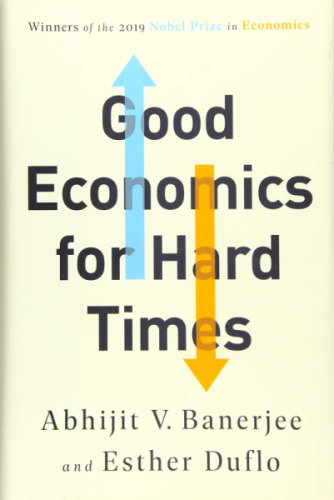
1. Government intervention: Necessary, but balancing on the edge of trust
First, she pointed out that we observe a decline in trust in government, including in South Korea. However, the government is crucial in situations where the market is incapable of solving the issues at hand. Government intervention, as COVID-19 showed, is necessary to control the spread of the virus, protect the people, and support the economy. The government has to intervene on behalf of society. At the same time, government intervention can easily lead to distrust from the people, who may question the restrictions and measures. “We are at a juncture,” she said, “from where we could go towards either direction— more trust or distrust in government.”
2. Financial incentives do not discourage people from working
Second, Prof. Duflo argued that financial incentives are more than overrated. There is a perception that people work more when wages are higher and less if taxes are higher. Support incentives are also thought to promote productivity, she said. These perceptions fuel widespread skepticism about the universal cash transfer program because it would, under these assumptions, discourage people from working. However, the evidence shows the opposite. According to a study conducted by Prof. Duflo, only 10% of respondents said they would stop working or looking for a job if they were provided with a universal basic income program. However, when respondents were asked how others will act under a UBI scheme, around 50% of respondents said they think others would stop working. The results, she argued, showed that the problem lies in the perception of UBI programs. Unemployment insurances or wage replacement programs introduced in the E.U. and the U.S. in the wake of the COVID-19 pandemic also showed little evidence of discouraging people from working, she said.
3. The economy is not as flexible as we think
The third lesson she provided was that the economy is not as flexible as we think. Many economists assume that people quickly respond to changing situations and easily move to other regions for economic opportunities. Contrary to this opinion, Prof. Duflo mentioned that people move much less than they used to. Particularly, social and geographic mobility has diminished since the postwar era. Moreover, she pointed out that COVID-19 induced border lockdowns and nationwide travel restrictions have been a disaster for migrants. Providing the example of India, Prof. Duflo highlighted that migrants not only lost their place of employment and living with the restrictions but were also denied any support from the government as the programs were tied to their place of origin. These shocks made people unable or unwilling to move again, and regions are being pushed into depression as a result.
4. Dignity matters
The fourth lesson from the book was that dignity matters. Dignity is more important to people than wages. Prof. Duflo expressed her concerns that a mental health crisis is emerging as regions are spiraling into depression. She said that in recent years, more people are dying from narcotics, alcohol, and suicide. Prof. Duflo described this phenomenon as a “death of despair pandemic.” According to the professor, the alarming trend began even before the COVID-19 outbreak, and with the two pandemics piled on each other now, the issue is even more worrisome.
Thoughts on Korea
1. Prioritize welfare over growth
Prof. Duflo agreed that South Korea’s drive for growth had been an ingredient for its success. However, she digressed, “But there is one thing to keep in mind. Growth is not important, per se. What is important is welfare.” She said we have lessons from the U.S. and U.K. from the early 1970s that teach us that cutting taxes on the rich and reducing welfare for the poor do nothing for growth. What it brought was an explosion of inequality. Korea’s economic growth was already slowing down before the pandemic, and there were reasons for that. Prof. Duflo suggested that instead of worrying so much about growth, South Korea should be more concerned about its welfare and making sure that welfare is equally shared.
2. Korean New Deal
Prof. Duflo discussed the three pillars of Korea’s recovery plan and suggested some ideas on what the Korean government should consider in the implementation process.
The right moment to assume leadership
First, she praised the Korean government for its leadership in forming a green economy. She added that with a new government in the U.S. and Europe’s green initiatives, there is a moment that we can do something about climate change. According to the professor, the pandemic has made people aware that nature is stronger than us, and stressed that this is the right moment to assume leadership to address the problem.
Compensate those who are vulnerable to digital change
Next, Prof. Duflo discussed the digital aspect of South Korea’s New Deal. She warned against the negative impacts of the digital revolution and underscored that these problems would have to be addressed. The coronavirus pandemic showed that the digital revolution could widen the gap. For example, it created winners and losers between those employed in jobs that can be performed remotely and those that are not. Moreover, the pandemic has accelerated automation in industries. Nowadays, there are more than enough incentives to replace human workers with robots, and the market does not always achieve a new equilibrium on its own. Therefore, workers who are more vulnerable to automation would be at a higher risk of losing out in the digital revolution. According to Prof. Duflo, the government’s role in this situation is to ensure that the vulnerable are adequately compensated and that people’s dignities are not destroyed in the compensation process.
Pursue humane and respectful redistribution
Finally, Prof. Duflo commented on the human pillar of the New Deal or the social safety net. She said that social protection systems around the world tend to exclude rather than include more people. She argued that we have to stop believing that social protection systems are like charity and emphasized that governments should make redistribution more humane and respectful. Otherwise, she added, it would create growing anger against the elites. “(We tend to think) we are being generous (with social protection systems), when in fact, the only thing that is happening is that people are being repaid for the cost they experience on behalf of the society,” she said. “I think it will be impossible to address global issues… if we do not make the efforts to have a more humane and respectful redistribution.”
Discussion Highlights
The keynote speech was followed by a discussion with Prof. Yeon-ho Lee of Yonsei University. Key insights of the discussion are as follows:

1. Elites, take action
Prof. Lee raised the question about the role of elites in good economics. Prof. Duflo explained that the elites, including professors, policy-makers, and business leaders, wittingly or unwittingly have been on the side of the rich. People were asked to wait by the elites, that innovation and economic gains will eventually trickle down and benefit the general population in the end. However, that promise did not materialize, and the elites have to acknowledge that their assumptions were wrong – that the market economy will not lead to a better life for the poor and the middle class. “And to regain our confidence,” she said, the elites should state, “this is what we are going to do,” and lay out programs to address the issues we face today.
2. Finance the programs though wealth tax
On financing social protection programs in the short-run, Prof. Duflo said that amassing government debt may finance the programs in the short term but argued that it would not work in the long-run. If governments finance programs with debt, sustained low-interest rates could pose problems as they would lead to the acquisition of assets and ultimately increase inequality. Prof. Duflo concluded that taxation and particularly wealth tax is the way to finance the programs.
3. Industrial policies: support sectors which create social externalities
Furthermore, the speakers exchanged opinions about growth strategies. Prof. Duflo emphasized that Korea is an interesting case because its growth was fueled by completely unorthodox policies, particularly heavy reliance on industrial policies. However, she warned that the context is different today, and adopting the same approach could lead to different results even for South Korea. Nevertheless, as South Korea demonstrated, industrial policies are not always as bad as economists tend to believe, she said.
On adopting industrial policies, she stressed that governments have to decide which industries they will support. “One way to think about industrial policies is, if the government wants to direct investment (into an area), the best place to direct them is the part of the economy that will have the most spillover effect on the rest of the economy.” She added that governments, for example, could invest in the infrastructure for climate change. However, according to the professor, it is important to invest in sectors that create social externalities and are people-intensive, like childcare. Such investments can create jobs that cannot be replaced by robots. She added that this is relatively closer to a budget policy than an industrial policy and argued that we need to recognize that there is value in sectors like education and early childhood care.
4. Basic income: targeted assistance is more appropriate for countries like Korea
Regarding basic income, Prof. Duflo separated approaches for developing and developed countries. For developing countries, she recommended implementing a universal very-basic income system, which means that the government would provide money enough to subsist for anybody who needs it. This is because governments of developing states have weak statistical systems that substantially hamper efforts to assess which groups of people need assistance. For the rich countries like South Korea that have the resources to determine who needs help, it would make sense to provide more help to people in need—in the form of both money and services, including good childcare, education, and training programs, she said. Thus, Prof. Duflo argued that universal assistance is suitable for poor countries, while targeted assistance is a better approach for countries like Korea.
The way to finance these programs is through taxation, she said. She added that if the governments manage to impose the taxes, it will not discourage anybody from working. Prof. Duflo warned that the elite and the rich need to understand the urgency of the situation. Unless something is done about the problem at hand, the entire system will collapse, she said.
5. Opening to trade does not reduce inequality
Prof. Duflo agreed that it is difficult for developing countries to jump into international free trade with export-oriented policies. Countries like Ethiopia would find it challenging to enter the global market because export powerhouses like China and South Korea have well-established reputations in the market. The pandemic can help them a little, she argued. The COVID-19 outbreak raised the need for diversification of supply chains, and this could direct investments to new destinations like Vietnam, she said. Still, she added, we have to remember that opening to trade does not necessarily reduce inequality within countries. Therefore, such initiatives should be accompanied by domestic policies, she said.
6. There are mindful ways of using technology for fighting poverty and inequality
Prof. Duflo’s prospects about the impact of technologies were quite gloomy. She explained that automation destroys jobs that are not always replaced by equally good jobs. However, there is still a way to use technology mindfully. She gave an example of Google and their use of technology in India and highlighted that this was a mindful way to use machine learning to create jobs.
7. Migrants are not competing with the locals; they are complementing them
Prof. Lee and Prof. Duflo agreed that Korea needs migrants due to low fertility and population aging. Prof. Duflo pointed out that migrants complement the Korean workers, not compete with them. In order to mitigate the discrimination problem, which Europe experienced, Prof. Duflo recommended integrating migrants with Koreans in all aspects of life at all levels. She closed her remarks by noting that the COVID-19 vaccine was developed by two Turkish Germans.
Messages from Prof. Duflo
In the last part of the webinar, Prof. Duflo shared three messages for the new leadership in the U.S., women economists, and the audience of the webinar.
Biden’s “Built Back Better” – be generous to the poorest
Prof. Duflo expressed hopes that the new leadership in the U.S. would be more generous to the poorest Americans, many of whom are white and many of whom voted for Trump. This may help revive the trust in government, she said.
Women Economists – hang on and continue to pursue economics
Prof. Duflo encouraged women economists to continue their works in economics. She explained that economics is not only about interest rates and finance, but that it is also about inequality, social policy, and climate change – the things that people care about. She added that economics needs diverse viewpoints to make it a successful and useful field.
Remember the lessons from COVID-19
Prof. Duflo concluded with the message that we will surmount the challenges of COVID-19. However, she stressed that we have to remember the lessons from our experience with the coronavirus. “We need to remember the warning that nature gave us that we need to get our acts together and work together to protect ourselves, the planet, and each other.”
* For the full keynote speech, refer to the YouTube video attached below.
< Copyright holder © TAEJAE FUTURE CONSENSUS INSTITUTE, Not available for redistribution >

